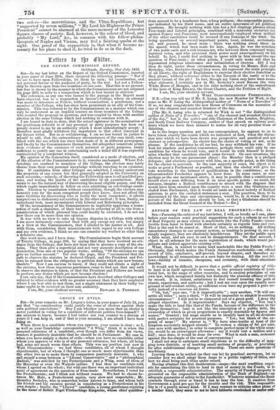Pflug to tht abr.
THE OXFORD COMMISSION REPORT.
Oaklands, Dursley, 31st July 1852.
Sin—In my last letter on the Report of the Oxford Cemmission, inserted in your paper of June 26th, there occurred the following passage : " But if we are to have open Fellowships, let them be open ; let examination, and not personal favour or the purposes of party, be the test. Let not a Fellow- ship be thrown open from two counties—to one man. That this is no ground- less fear is shown by the manner in which the Commissioners are net ashamed (in page 203) to refer to a transaction which is best buried in oblivion." The reference, as any one who turned to the passage in the Report must have observed, was to a transaction in Queen's College, where an attempt was made to introduce as Fellow, without examination, a gentleman, not a member of the College, who has since been prominent as an ally of the Com- mission. This was referred to by the Commissioners in a manner which can only be understood as an implied censure on those members of the College who resisted the proposal in question, and was coupled by them with another election in the same College which had nothing in common with it. I am bound in duty to state, that the actual existence in the nomination of the gentleman referred to of any .personal or party purposes has been ex- pressly denied to me by an authority which I most unhesitatingly accept : I therefore most gladly withdraw the imputation to that effect conveyed in my former letter. But in so withdrawing, I am no lees bound in justice to myself to add, that the extraordinary circumstances of the ease itself, com- bined with the use which has since been made of it in different newspapers, and finally by the Commissioners themselves, did altogether constitute prima facie evidence of the existence of such personal or party purposes, amply sufficient to justify any one in entertaining such a belief till it was expressly contradicted by a competent witness. My opinion of the transaction itself, considered as a mode of election, and of the allusion of the Commissioners to it, remains unchanged. Where Fel- lowships are confined to members of the College, the electors may fairly ohoose from their own personal knowledge without resorting to an examina- tion. If candidates from other Colleges are admitted, I cannot understand the propriety of any course but that generally adopted in the University on such occasions,—namely, of throwing the Fellowship open to all qualified per- sons, and testing the merits of the candidates by an examination. Such seems to me the natural way of discovering the most eligible person, and that which ought immediately to follow on once admitting an out-College candi- date. Election by nomination without competition, though the electors may honestly rote for the most competent person they know, does not afford the same facilities for discovering who is really the most competent ; it affords temptations to dishonesty not existing in the other method ; it has, finally, an underhand look, most inconsistent with Liberal and Reforming principles. Of the inconsistency of the Commissioners in implicitly approving a trans- action of such a character, of their bad taste in refeprring at all to one from a consideration of which personal bias could hardly be excluded, I do not see how there can be more than one opinion. It was with no view to rake up bygone disputes in a College with which I am more intimately connected than with any except my own, but simply as a blow at the Commissioners, that I alluded to the matter at all. And with them, considering their misstatements with regard to my own College and my own evidence, I think no one can consider my warfare as other than a defensive one.
One word more, and I have done. The Commissioners begin their account of Trinity College, in pap 236, by saying that they have received no evi- dence from the College, and have not been able to procure a copy of the eta- -tutee. They then give a superficial and not very accurate description of our foundation, from one or two popular works; adding, "Of the statutes we can give no further account." Yet over the page, they "recommend that the oath to observe the statutes be declared illegal, and the President and Fel- lows be released from the obligation to perform duties which are now become obsolete." Now I am curious to know, if they could not obtain a sight of the statutes, how these ingenious gentlemen came to find out that any oath to observe the statutes is taken, or that the President and Fellows are bound to perform any duties which are now become obsolete ? I can only say, that if the Commissioners have described other Colleges and referred to other evidence with no greater accuracy than they have employed where I am best able to test them, not a single statement in their bulky TO.. lume ought to be received on their sole authority.


























 Previous page
Previous page